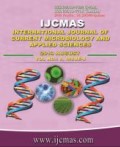


 National Academy of Agricultural Sciences (NAAS)
National Academy of Agricultural Sciences (NAAS)

|
PRINT ISSN : 2319-7692
Online ISSN : 2319-7706 Issues : 12 per year Publisher : Excellent Publishers Email : editorijcmas@gmail.com / submit@ijcmas.com Editor-in-chief: Dr.M.Prakash Index Copernicus ICV 2018: 95.39 NAAS RATING 2020: 5.38 |
Infection of sterile body fluid can lead to severe morbidity and mortality. Periodic surveillance and monitoring programmers are helpful for framing the antibiotic policy. The present study was undertaken to evaluate aerobic bacteriological profile along with their antibiogram from various sterile fluids over a period of five years. A total of 1708 body fluid samples were processed according to Standard guidelines and analysed in order to assess the changing trends in bacteriological profile and antibiogram. Out of 1708 body fluid samples 351 samples showed growth of organisms with an isolation rate of 20.55%. Isolates from different fluids were E. coli (27.92%), Klebsiella (22.22%), Staphylococcus aureus (17.66%), Pseudomonas species (12.53%), Streptococcus pneumoniae (5.41%), Enterococcus species (3.41%), Streptococcus pyogenes (3.41%), Acinetobacter species (2.27%), CONS (2.27%), Proteus species (1.7%) and Citrobacter species (1.13%). Gram negative isolates were mostly sensitive to carbapenems and aminoglycosides and gram positive isolates were highly sensitive to Vancomycin, aminoglycosides and fluoroquinolones. Acinetobacter and Klebsiella species were the most resistant pathogens. About 17.66% of Staphylococcus aureus were MRSA. So regular monitoring of prevalent pathogenic organisms and their sensitivities are essential as they help in formulating hospital antibiotic policy and aid the clinician in appropriate selection of antibiotic therapy, thereby preventing the indiscriminate use of unnecessary antibiotics and development of antibiotic resistance.
 |
 |
 |
 |
 |